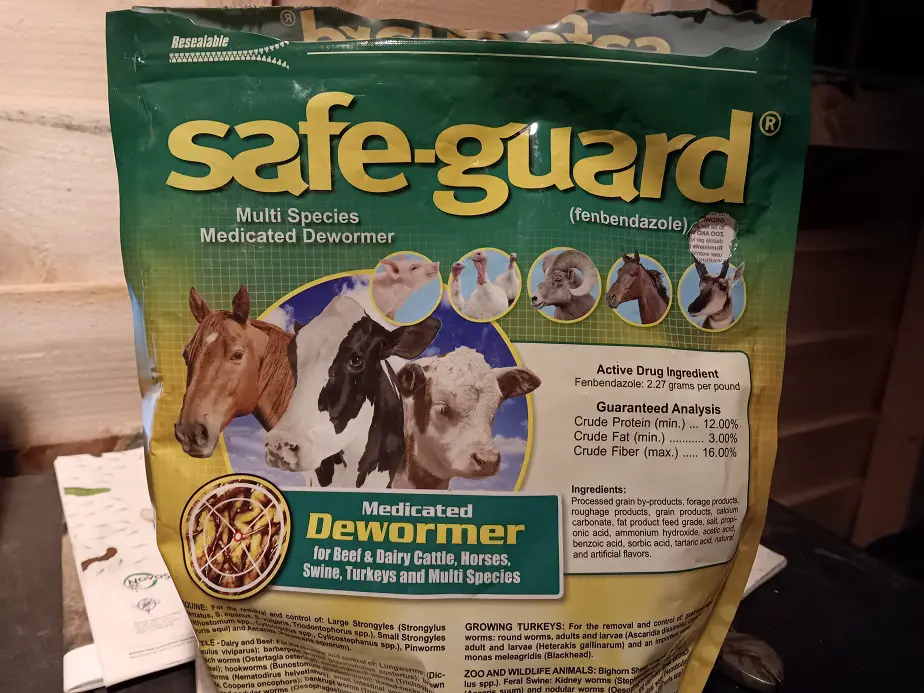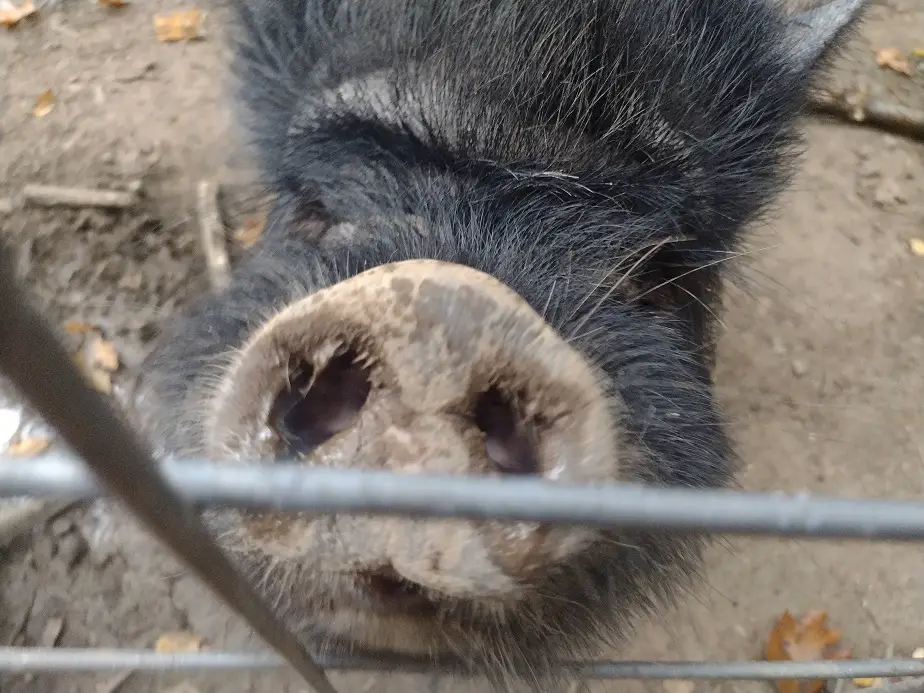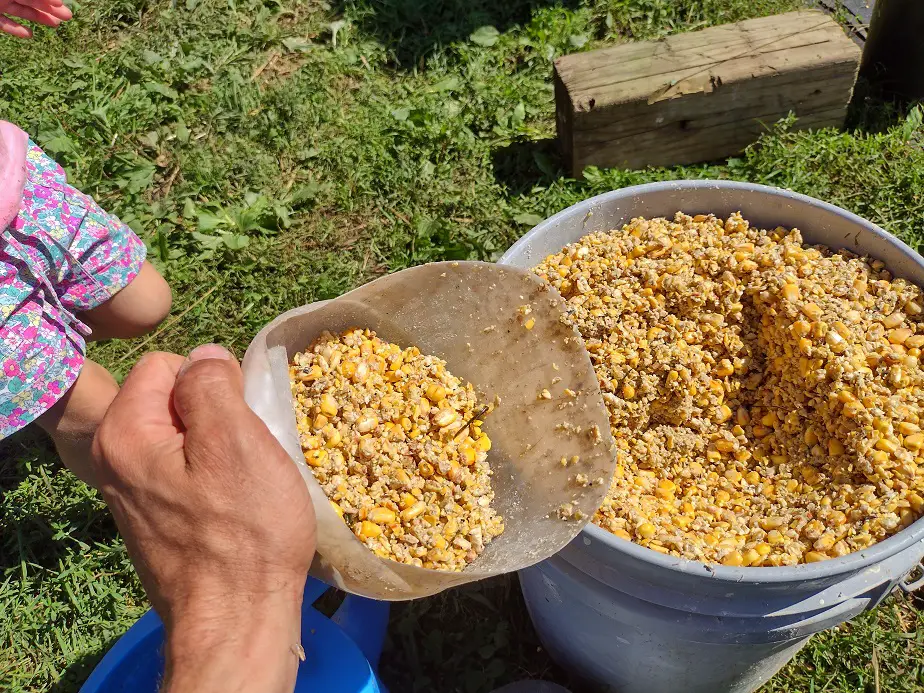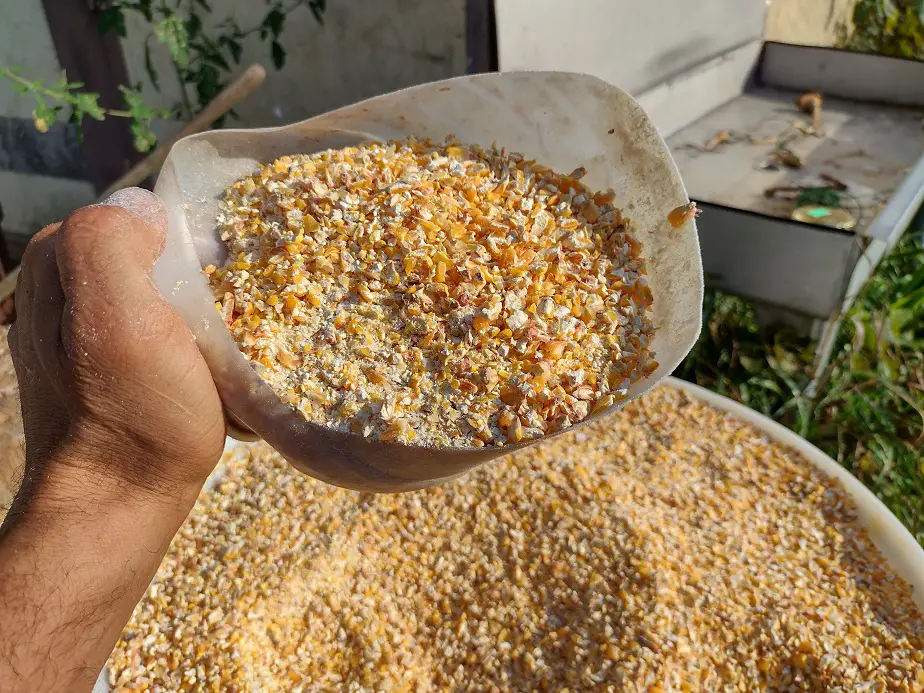I have been raising pigs for years and have used every method to feed pigs I can think of.
Corn can make pigs fat if it’s the only thing they eat, or of the pig is getting too much corn and not enough fiber and vegetative fodder. Older pigs are especially prone to getting fat on corn. After 5 months old, most breeds of pigs start to gain extra fat on a diet high in raw grains like corn.
So, it can fatten up a pig well, or possibly too much. Let’s talk about how to use corn properly for pig feed.
Should Pigs Eat Corn?
Most pigs in the US should probably eat some corn in their regular diet. It’s the cheapest and most common energy source available for purchase. Corn is able to make up as much as 95 percent of a healthful diet for pigs, if you use it right. Corn is not necessary but is commonly used.
When I was early into pigs, I tried a diet of mostly dry whole corn. It kept them fed but they weren’t growing properly or looking quite right. Once I learned how to add the right supplements to their diet, the pigs came around in their growth, condition, and performance.
If you get a weaned pig and feed it only corn, it will grow well at first, but after a few months, it will be coming out far behind. It just doesn’t have the nutrition by itself. You have to add a source of vitamins, minerals, fiber, and protein.
More on that in this article: Can Pigs Live on Just Corn
Corn intake is sometimes increased to fatten up pigs for butcher. This is particularly so for pigs raised on a more wild or vegetative-based diet. If pigs have been eating a lower-calorie diet, which is usually just fine, the meat can be improved by feeding grains for a month or two.
Most commercial pig feeds are between 75 and 90 percent yellow corn, with soy, oil, minerals, and vitamins added. If you’re keeping a pig longer than 6 or 7 months, continually feeding a corn-high diet may end up making the beast quite fat.
I have fattened pigs on a diet of 90 percent corn with a little grass. I have raised healthy pigs to butcher on 90 percent fermented corn with some grass. Fermenting changes the sugar, starch, and protein profiles in the grain and makes it a lower sugar, higher protein, higher nutrition feed. Fermenting is awesome and pretty simple. You should at least be familiar with the process.
If you want to read more about fermenting corn, Here’s an article I wrote about Making Fermented Feed for Pigs

One thing you need for pigs, no matter your raising system, is a parasitic worm treatment. The best swine dewormer is Fenbendazole. It’s known by the brand name Safeguard. Safeguard is available as a medicated corn/alfalfa pellet. It’s the only way I can worm my pigs since they won’t stand still for an injection of Ivermectin. It’s easy and cheap.
- There is a stronger pellet for swine only. Here it is on Amazon
- There is a weaker pellet for general barnyard livestock, including swine. Here it is on Amazon.
I use the multi-species version because it’s what’s available in my local store and I can use it for my chickens too. It’s the most effective swine wormer and the easiest to administer. I use it on all weaned piglets and adults twice a year. Don’t go without it.

Pigs Fed Corn with Glyphosate Residue
Roundup-Ready GMO corn should be avoided when possible due to its high levels of glyphosate residue and the subsequent negative impact on swine’s gut microbiome.
Corn is not bad for pigs, It’s really good for them. There is currently an expanding fringe of pig farmers, mostly small-time operations, who stay away from all corn in feed. Some of them do it simply because there’s a small boutique market for corn-free pork. Others do it out of concern.
Corn is not toxic as some crazy health hippies have tried to say. It’s not full of sugar, and it’s not hard to digest. We feed a lot of corn to our pigs, as well as other grains. Pigs probably should eat some corn as long as it’s clean and of good quality. Now let’s talk about some of the real potential concerns.
Recently, studies have come out giving increasing concern about Glyphosate residue in animal feed, and even in the meat of animals fed the treated crops. Just to get you started thinking, Here’s an article from the National Library of Medicine about how glyphosate residue affects gut health and mental health.
After reading dozens of reports, I have to agree that it’s not preferred. Pigs shouldn’t be fed corn treated with Round-Up. But, that cleaner corn usually costs twice as much to buy and very few farmers are willing to grow it.
A high-corn diet is known to cause a significant increase in stomach ulcers among swine. It was believed to be a result of the high starch (85 percent corn) diet, but myself and others think it’s got more to do with how the roundup messes with the gut. Probably 99.5 percent of US pigs are fed the tainted corn.
Hopefully, we can make it more common to grow corn without the roundup, aka glyphosate. But, it will be more expensive.

Fermenting Corn for Pigs
Fermented corn causes better feed digestion and boosts the health and growth of swine as compared to dry corn. Fermenting corn causes better digestibility and nutrient absorption than finely grinding it. It has much more protein and is considered a probiotic which reduces the smell and infectious bacteria from manure.
Fermenting also reduces the amount of glyphosate residue in the grain. One particular genus of bacteria called acetobacter is common in fermented grains and is very good at destroying those herbicide residues. Other fermentation enzymes and organisms also work to break it down, but at seemingly lesser rates.
I ferment all grains before feeding them to our pigs. We don’t buy a blended pig feed, only whole grains from the farmer down the road. But, you could ferment a pre-mixed hog feed the same way and get pretty much the same benefits.
Related Articles:

